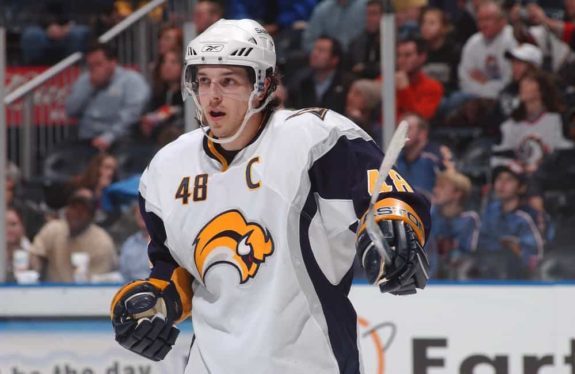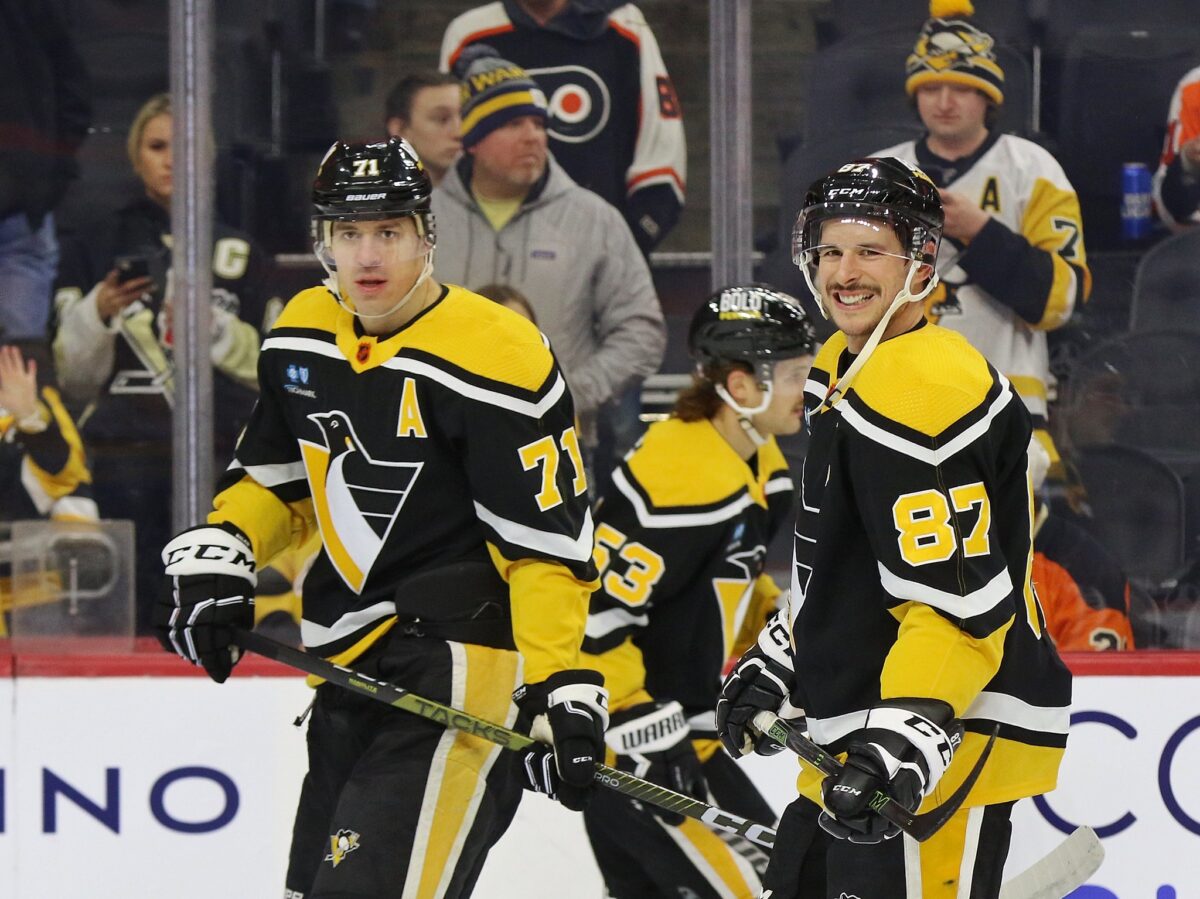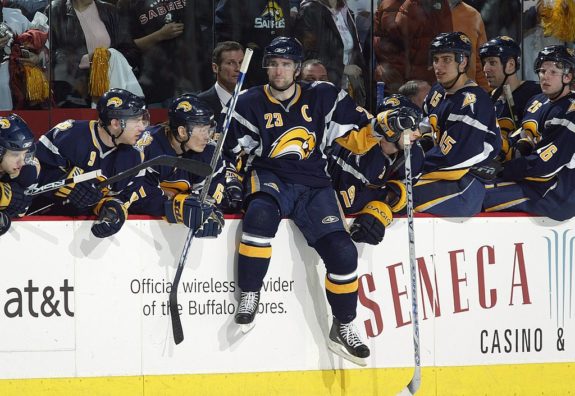Daniel Briere and Chris Drury: no two names haunt fans of the Buffalo Sabres more. In the scope of the Sabres, the two are synonymous and it’s impossible to think of one without the other. When Buffalonians look back longingly upon the dynamic teams of the mid-2000s led by the two co-captains, they’re then subsequently tormented by the memory of the summer of 2007 and the two thoughts that must often come with it.
For starters, those were the last truly great Buffalo hockey teams to date and the franchise as a whole has never come close to the same heights since. The Sabres were, for a brief period, the NHL’s most must-see team and Western New York was a lovefest. Tickets were impossible to come by, people flocked to bars and screening parties to watch games together and blue and gold was everywhere you looked. It’s a reminder of how magical the region can feel when everyone is truly invested, something that hasn’t been the case for a long, long time.
The second is perhaps the most dreaded question in Buffalo sports: what if Briere and Drury had been re-signed in the summer of 2007 instead of somehow being allowed to walk? Would the team actually have gone on to claim the Stanley Cup that fans are so sure was within their grasp? It’s a hypothetical that’s been pondered countless times but seems to have never been actually explored in depth. So why don’t we? Using as much hard evidence as we can to avoid nostalgia bias, let’s step into an alternative dimension and see what actually might have happened.
Greatness Lost
Briere and Drury’s abilities complemented each other magnificently and their value to the Sabres was layered. Briere, a talented playmaker, was the team’s best player while Drury was a blood-and-guts leader by example. The 2006-07 season was a banner year for both and they combined for 164 points (95 and 69 respectively, both career-highs). As the Sabres’ top two centers, they were the core of a fast and tenacious band of youngsters that racked up a whopping 308 goals that season, 20 more than the next-closest team. Though they were sound in other areas as well, that was the key to their success: score, score, and score again.
By failing to retain them, Buffalo gutted itself in more ways than one. The Sabres were one of the NHL’s youngest teams at the time and behind the co-captains was a plethora of emerging nascent talent. 23-year-old Thomas Vanek was coming off an 84-point season while Jason Pominville and Derek Roy (both 24) had both scored 60-plus points. A myriad of other contributors all factored in as well, giving the Sabres perhaps the NHL’s deepest pool. But the co-captains were the linchpins through all that and the same results proved unattainable without them.

What seems to have been forgotten in hindsight is that the Sabres still competed in the aftermath and scored 255 goals without them the next season, a very steep drop but still the fourth-most in the NHL and the most amongst teams that missed the postseason. But though Briere and Drury’s offensive contributions were certainly missed and may have been the difference in a number of close games, it was the intangibles they brought that may have been missed even more.
When the co-captains departed, in many ways the team’s identity was lost. They were the physical and spiritual leaders of a burgeoning squad that needed guidance and mentoring. In addition to the stats, the Sabre brass vastly undervalued the edge and direction that Briere and Drury had provided and the subsequent lack of it was incredibly obvious in the years that followed. The duo had been the team’s X-factor and it was gone. The Sabres’ roster for the 2007-08 season was practically identical otherwise, but it wasn’t the same team.
Had Briere and Drury Stayed
The possibilities would have been endless had they been re-signed. It’s true that this almost certainly would have resulted in Vanek’s offer sheet from Edmonton not being matched, but fans would have easily sacrificed him to have their cornerstones back and, frankly, that’s how it should have gone. Vanek’s absence too would have been considerable, but Briere and Drury would have compensated for it easily and the Sabres could have remained the same powerhouse that was anchored by the skyrocketing Ryan Miller in goal.
Miller played very well in 2007-08 but the lack of a viable backup (we’ll get to that) led to an extremely heavy workload. Had the team kept scoring at the same rate, there would have been considerably less stress on the backstop and he may have been even stronger despite being run into the ground, improving the odds even more.
The 2006-07 season had been thrilling for the Sabres but they eventually ran out of gas and fell anticlimactically in the conference final to Ottawa. As much as the loss stung, there was belief that the good times weren’t over in Buffalo and that the team would bounce back. Of course, thanks to the aforementioned factors, that didn’t happen, but if Briere and Drury hadn’t departed, there’s a very strong chance it could have.

Even without Vanek, the Scorching Sabres still would have remained. 2007-08 was the finest season of both Roy and Pominville’s careers with 81 and 80 points respectively and five other players managed to hit the 40-point mark. Tim Connolly was limited to 48 games from bone spurs but still scored 40 points and even Paul Gaustad, a defensively oriented fourth-line center elevated to top-six status managed 10 goals and 36 points. Sophomores Drew Stafford and Daniel Paille had good showings as well with 38 and 35 points, respectively despite far less veteran wisdom to fall back on.
Given the statistical evidence we have, there’s strong cause for speculation here. How much more could the Sabres have done with Briere, the offensive catalyst, still in the fold? How much better would the team’s many upstart youngsters have done with Drury’s calming presence guiding them? The gallant efforts of the entire team got the Sabres close and they missed the playoffs by just four points, making it very safe to conclude that their co-captains were the difference makers. But was that all?
Changes in the East
It’s very important to remember that Briere and Drury’s departures alone weren’t the only reason Buffalo fell off. Another very big factor was that the rest of the league simply caught up. The infusion of the numerous young stars into the lineup gave the Sabres a massive head start on the rest of the NHL after the 2004-05 Lockout, allowing them to explode out of the gate and leave everyone in the dust. But by the time of the 2007-08 campaign the powers were beginning to shift and losing their co-captains only accelerated it.
A number of teams in the East dropped precipitously that season and it opened the door for others to capitalize, but perhaps none more than the Sabres and Ottawa Senators. While the Sabres plummeted to 10th place a year after being the regular season champion, the Senators (fresh off their first-ever Stanley Cup Final appearance) dropped from fourth to seventh and were eliminated in the first round by Pittsburgh, a team they had steamrolled the previous year.
With reigning MVP Sidney Crosby and 2008 MVP finalist Evgeni Malkin leading the way, things finally clicked for the Penguins after years of rebuilding. Not even losing goaltender Marc-Andre Fleury for over half the season could spell doom, as backup Ty Conklin was sensational and went 17-6-5 in his absence. In a tremendous bit of irony, Conklin had been with the Sabres to finish the prior season and could have provided desperately needed relief for Miller, but wasn’t retained.

As a result, Pittsburgh finished second in the East and lost just two games en route to the Stanley Cup Final before finally falling to Detroit. Had the Sabres continued their winning ways, the Penguins would have been their top competition and the two undoubtedly would have crossed paths eventually. The Penguins might not have been able to match the Sabres’ depth but had the veteran leadership that Buffalo largely lacked, evening the cards.
That season they met in the inaugural Winter Classic event in Buffalo, won by Pittsburgh in a shootout thanks to Crosby. For the Penguins, the win was an omen of good things to come and seemed to cement them as the new kings of the East, but would the outcome of that game have been different had Briere and Drury still been wearing the blue and gold? Would a Sabres victory have asserted their dominance instead?
Reimagining the 2007-08 Season: Was It Possible?
Both men continuing to lead in their respective ways would have eliminated most of the trials and tribulations that the Sabres encountered that season, seeing as most of them resulted from the growing pains of a young team suddenly losing its trajectory. And that’s a good thing because, with numerous other teams like Boston and Chicago quickly on the rise, 2008 might be the Sabres’ last chance, their window is closing. But with the same team that had been so dominant the last two years, this season goes differently in Buffalo.
Related: 5 Players the Sabres Should Trade For
The 10-game losing streak from late December to mid-January that ultimately doomed their playoff hopes certainly doesn’t happen and a number of games, including the 15 they lost by a single goal, probably go a different way. Their improved standing likely convinces the front office to hold on to star defenseman Brian Campbell rather than trading him at the deadline. Though it means possibly losing him in free agency, another massive piece is retained and it makes their short-term prospects all the better. The team certainly makes the playoffs and has the speed and skill to match up favorably against any opponent.
In the postseason, the Sabres and Penguins are all but guaranteed to meet at some point and it would most likely be in the conference final (Buffalo’s third in a row). With a much more sound lineup, Buffalo doesn’t get swept by Pittsburgh in the regular season and therefore the series is anybody’s ballgame. The Sabres can’t match the star power of Crosby, Malkin and Fleury but their lineup is every bit as versatile and has their recent postseason successes to back it up.

Containing Crosby and Malkin is no small task but Buffalo has the defense for it, with Campbell and veteran stalwart Teppo Numminen leading the way. Limiting the top two stars forces Pittsburgh’s secondary scorers to shoulder the weight, but they’re no match for Buffalo’s incredible depth and just can’t keep up. Fleury will go on to be an NHL legend but Miller is his superior at this point and can outduel him as he did Henrik Lundqvist the previous year. The Sabres have what it takes to beat the Penguins and head to their first Stanley Cup Final in nine years, but their work is cut out for them still and then some.
The Western Conference champion will still be the 115-point, Presidents’ Trophy-winning Detroit Red Wings, unquestionably the best team in the NHL that year. Unlike the upstart Sabres and Penguins, Detroit’s roster is jampacked with proven veteran talents, many of whom have won Cups in the Motor City before, among them Hall of Famers Nicklas Lidstrom and Pavel Datsyuk. These Red Wings are the definition of formidable and play Goliath against any opponent, their combination of skill and experience just can’t be matched.
This is the tallest task the Sabres have faced yet and a triumph is going to require every bit of their gumption. The Red Wings have the pedigree needed to win championships and the Sabres simply don’t measure up in that regard. However, their speed, skill and resilience give them a potentially huge edge against a Detroit team excelling despite its collective age. Over the last two years, the Sabres have proven themselves by their resiliency and have shown that you can’t ever count them out no matter the odds. Popular wisdom puts age before beauty, but which comes out on top in this case?
We’ll Just Never Know
Since there’s obviously no way to tell definitely what would have happened in this alternate universe, we can’t conclude one way or another. There’s an argument to be had that the Sabres had the Stanley Cup within their reach if they had continued on that scorching trajectory, but it’s also possible that they missed their window and wouldn’t have had the same chances as those previous two seasons. As a result, you get to be the judge. Would the Sabres have claimed a championship by now if Briere and Drury had stayed in Buffalo, or does reality get lost in hindsight?
